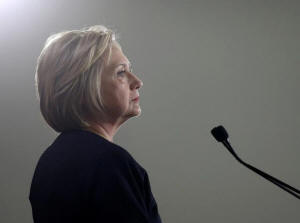|
Clinton calls for U.S. ‘intelligence
surge’ in wake of Orlando attack
 Send a link to a friend
Send a link to a friend
 [June 14, 2016]
By Dustin Volz [June 14, 2016]
By Dustin Volz
WASHINGTON (Reuters) - Presumptive
Democratic presidential nominee Hillary Clinton said on Monday that if
elected, she would pressure U.S. technology companies to help
intelligence agencies disrupt violent plots after a gunman inspired by
radical Islamist groups killed 49 people in an Orlando nightclub.
In a speech in Cleveland, she articulated plans for expanded
online surveillance of potential extremist attackers. She is
campaigning against presumptive Republican nominee Donald Trump
ahead of the November presidential election.
"We already know we need more resources for this fight. The
professionals who keep us safe would be the first to say we need
better intelligence to discover and disrupt terrorist plots before
they can be carried out," Clinton said.
"That’s why I’ve proposed an ‘intelligence surge’ to bolster our
capabilities across the board, with appropriate safeguards here at
home."
While Clinton did not detail what her effort would entail, she said
she wants technology companies to be more cooperative to government
requests for help in countering online propaganda, tracking patterns
in social media and intercepting communications.
 Clinton's comments will likely further stoke an international debate
over digital privacy, which has flared after attacks in Paris,
Brussels and San Bernardino, California.
Omar Mateen, the 29-year-old Orlando shooter and a U.S. citizen, was
likely inspired by jihadist content online, but there is not yet
evidence that he was part of any plot directed by others outside the
United States, FBI Director James Comey said Monday.
Facebook <FB.O>, Alphabet's Google <GOOGL.O> and Twitter <TWTR.N>
have all dedicated more resources to combating online propaganda and
recruiting by Islamic militants within the past year. But they do so
quietly to avoid the perception that they are overly cozy with
authorities.
[to top of second column] |

Democratic U.S. presidential candidate Hillary Clinton pauses as she
speaks at a campaign rally in Cleveland, Ohio June 13, 2016.
REUTERS/Aaron Josefczyk

The companies rely heavily on users to flag problematic content,
which is impossible to eliminate completely without creating a
highly censored Internet, according to technologists.
Counterterrorism experts have also long said so-called lone wolf
attackers are difficult to track and stop because they often do not
communicate their plans to others.
Twitter and Facebook had no immediate response to questions about
Clinton’s comments. Google declined comment.
The Center for Democracy and Technology and Electronic Frontier
Foundation, both digital advocacy groups, said they were waiting for
more specifics from Clinton before commenting.
Unlike Trump, Clinton did not call for blocking online content. She
did not reiterate her previous push for a massive effort to break
encryption, and she ruled out targeted surveillance of Muslim
Americans as "dangerous."
(Reporting by Dustin Volz in Washington; additional reporting by
Julia Edwards in Washington and Joseph Menn in San Francisco;
Editing by Cynthia Osterman)
[© 2016 Thomson Reuters. All rights
reserved.]
Copyright 2016 Reuters. All rights reserved. This material may not be published,
broadcast, rewritten or redistributed.
 |